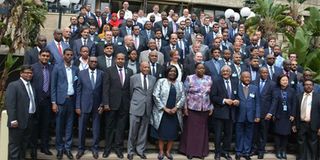War on Indian Ocean piracy cost Sh140 billion last year

Participants at the Contact Group on Piracy off the Coast of Somalia meeting. PHOTO | EUNICE MURATHE
What you need to know:
The Contact Group on Piracy off the Coast of Somalia (CGPCS) said the figures were the latest from Oceans Beyond Piracy (OBP), a programme of the One Earth Future Foundation.
About $1.4 billion (Sh140 billion) was spent on the war on piracy in the Western Indian Ocean bloc last year, a team formed to find ways of fighting the menace says.
The Contact Group on Piracy off the Coast of Somalia (CGPCS) said the figures were the latest from Oceans Beyond Piracy (OBP), a programme of the One Earth Future Foundation.
The foundation is a privately funded non-profit organisation based in Colorado, USA. The cost includes money paid by shipping operators for increased insurance due to piracy, labour, armed guards and other protection measures, ransom paid by insurers and the cost of naval deployments.
More than 200 participants from 50 countries and organisations met in Nairobi mid last month to discuss a global approach to combat maritime piracy. The forum was organised by the Indian Ocean Commission (IOC), CGPCS, the Kenyan government and the United Nations Office on Drugs and Crime (UNODC).
Participants reiterated the commitment of the region and the international community to fight piracy and its root causes. The economic cost of piracy caused by groups in Somalia increased to $1.7 billion (Sh170 billion) in 2016, from $1.3 billion (Sh130 billion) in 2015.
The cost had been trending downwards from $7 billion (Sh700 billion) in 2010 due to counter-piracy measures. The 21st plenary session of the CGPCS chaired by Mauritius Foreign Affairs minister and IOC chair Vishnu Lutchmeenaraidoo was an opportunity to assess the status of maritime piracy in the Western Indian Ocean.
Representatives of EU NAVFOR Somalia and Combined Maritime Forces (CMF) identified rare cases of piracy since the resurgence of attacks at the beginning of 2017 — namely two attacks in November 2017; the alleged perpetrators are awaiting trial in the Seychelles — and one attack at the beginning of this year. "We must not ease our efforts," stressed Lucthmeenaraidoo. Members of the Contact Group and the EU vouched for the extension of the mandate of the EU NAVFOR mission until December 2020.
EU NAVFOR Somalia, also known as Operation Atalanta, is a counter-piracy military operation at sea off the Horn of Africa. Furthermore, participants stressed the importance of stopping the threat of piracy. The mission will also be given a broader mandate to cover all crimes and threats directly related to piracy.
Kenya’s Defence secretary Raychelle Omamo urged for heightened war on terrorism and piracy saying they were connected. "We must fight these ills — piracy and terrorism — in tandem because in many ways terrorism extends into the waters through piracy and piracy extends to land through terrorism," she said.
Mr Lutchmeenaraidoo added: "We cannot fight effectively nor permanently remove piracy if we do not tackle all the crimes and threats that feed on or are fuelled by piracy. “That is why I suggested that we start thinking about the possible extension of the mandate of the Contact Group and that the outcomes be submitted to the next plenary session for debate.”
“Members of CGPCS have confirmed the usefulness of this forum which allows the exchange of on-going initiatives and offers a comprehensive outlook on the activities of the fight against piracy,” a statement from CGPCS said. It noted that maritime security is emerging as a key issue of development in eastern and southern Africa.
Foreign Affairs secretary Monica Juma said maritime security is key to the growth of the blue economy.
"It is becoming a very important foundation for strategies to create the blue economy as a new pillar of prosperity for coastal communities and for improving their livelihoods,” said Ms Juma. IOC secretary-general Hamada Madi added: "The potential of the blue economy for growth and social progress will emerge only if we are able to collectively provide safety at sea with the support of our partners in the international community.
“The CGPCS is thus an expression of a common goal to cooperate not only for regional stability crucial for development in eastern and southern Africa, but also for the security of sea routes in the Indian Ocean among the most important for international trade.” The next plenary session of CGPCS will be held in 2019.




